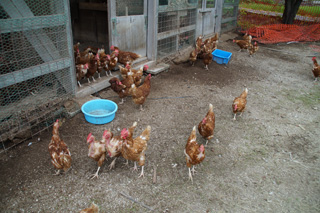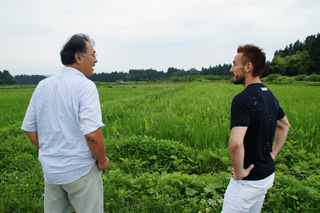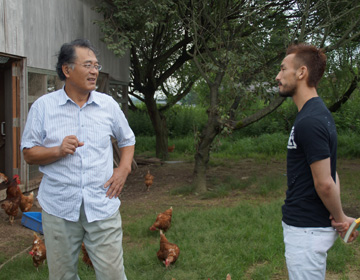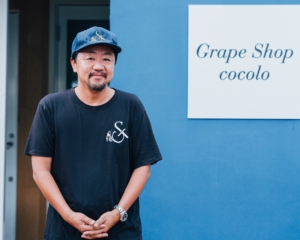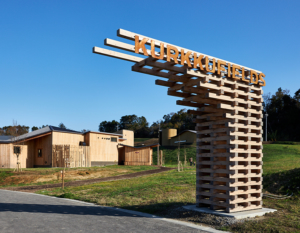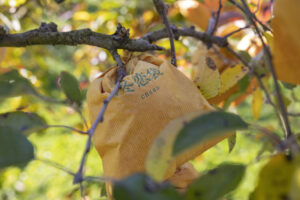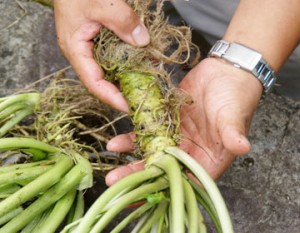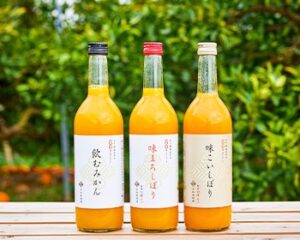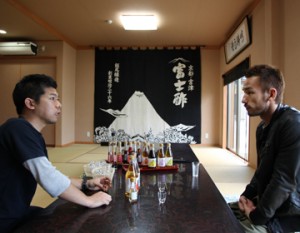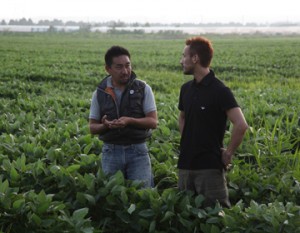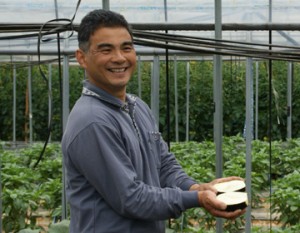Soil is the source of life
Yoshihide Kanno is a farmer who grows crops as well as chicken, operates sustainable agriculture, and regional development in Nagai, Yamagata. When we visited him, he showed us data on the nutrients included in several vegetables like green pepper and asparagus. The amount of such nutrients as vitamin C, calcium, iron and other nutrients had dropped dramatically across the board when compared to the data in 1964 and 2000.
”Today’s vegetables may be better looking on the surface, but they have less nutrients. Vegetables are a reflection of soil. The soil has lost its power.” Kanno told us. It is believed that the power of soil has declined with the use of chemical fertilizers in the 1960s.
Kanno’s idea on agriculture is based on soil. Crop doesn’t grow in sandy soil, nor where it’s purely clay. This is because these things are basically non-organic minerals. But crops can grow in soil. Soil is a collection of dead organisms. That soil is the source of our lives and the lives that are yet unborn. It is necessary to think about the relationship between soil and our lives. He is running a sustainable agriculture where he thinks not just about productivity, but also about how soil affects the crops and the human body that consumes them.
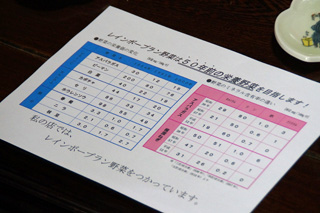
Leaving good environment, health, and universal merit
Kanno is also putting effort into the development of the local community. He told us the motives. “As I was farming, I was gazing at the mountains and realized that our ancestors from three generations or more ago planted trees for future generations. They left us with batons to relay to future generations of the community, and I could find such instances in our paddies and fields, and in the scenery.
Thus he decided that he would continue farming and community service for a better life for his sons and grandsons’ generations. That’s why he started the “Rainbow Plan”.
It involves the placement of bins in the urban areas of Nagai to throw away kitchen garbage, which is collected twice a week, then processed at the compost center, to be used for agriculture in the rural areas, producing and selling crops with reduced chemical fertilizers. Almost all 5000 families in the urban areas participate, they accurately separate their trash for this purpose.
The Rainbow Plan is not just about the recycling of kitchen garbage. The second perspective is about the urban people who make the compost and the people who grow crops becoming involved in farming together. The Rainbow Plan has attracted the interest of many communities around the nation, and many municipalities visit Nagai to learn from this example.
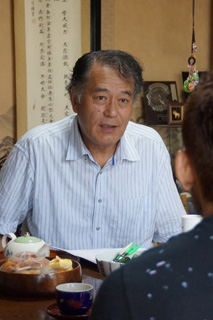
The friendly chicken
When we were shown to the chicken coop, we were greeted by a lively bunch of chicken.
They tend to be in the chicken coop in the morning because it’s their time to lay eggs, but they run around outside all afternoon. They are very healthy. Kanno wanted to build a system where he raises livestock with the crop he grew in the field, then recycles the livestock droppings to compost to grow their feed again. This is called “composite agriculture with livestock” and he had been interested in the idea for a long time. It was when his baby was born, the image of eggs came to his mind. It occurred to him that he wanted his child to grow up eating properly raised eggs. So he started with five hens, which eventually grew to a hundred, then to one thousand.
The type of chicken he now raises are “Boris Brown” which lay brown eggs, and “Momiji” from Goto Hatchery. He sometimes eats their meat too. They are raised slowly, and their meat is firmer than those raised for meat, but they are more flavorful and their bones make great chicken soup, he told us.
The system where the compost from hen droppings are used in rice paddies and the fields, and the waste rice and vegetables as well as weed that comes from farming operations are fed to the hens, is virtually waste free. And it winds up in great tasting eggs laid by healthy hens.
“You know, there is such a thing as universal merit. Like protecting the environment, and eating healthy food. Agriculture has such innate power that contributes to the world like that.” said Kanno. Many young people who aim to engage in agriculture learn about Kanno’s philosophy and activities, and visit him seeking advice. His thoughts and activities are relayed to the next generation in terms of soil, community, and people.
